
Reflecting on China's evolution between 2017 and 2019.
Many outlets covered the transformation that took place in China since the '80s, and when I visited the country for the first time in 2017, people told me fascinating stories of fast-paced changes. But while I listened, I couldn't fully comprehend them. It is like when a baker tells you how to make bread – it gives you an idea, but until you try it on your own, it is difficult to appreciate the entire craft of it. I had no previous experience of this place, so I couldn't make a personal comparison of different periods. That, however, changed earlier this summer. But really... how much of a difference can two years make? And, isn't the phase of rapid progress already over? I thought. As it turned out, it is still running strong, and experiencing it on my own was pretty mesmerizing.
For foreigners like me, an improvement that made a massive difference was the overall level of English. Two years ago, there would be many English signs already, but most were as if they got generated by the first version of google translate – the grammar and meaning often suffered. Same with clothes; many locals wore t-shirts with weird writings such as: "A ideal again tired also," "Happy in your heat," and even some offensive language.
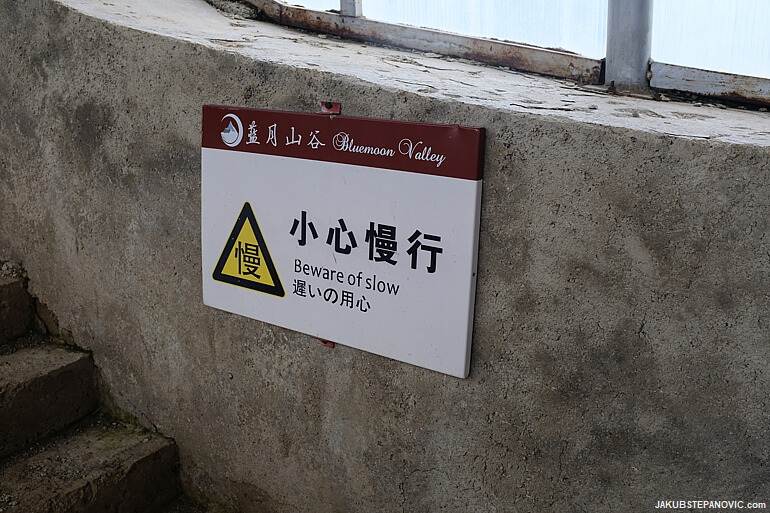
Okay..?
There are still some odd shirts and signs to be seen nowadays; however, English in China got significantly better, so navigating through is easy, and the chances of having a good chat increased too. I got to speak with many locals about their values, beliefs, and life in general, which made my stay more meaningful.
Language is only one element of people's behavior that changed for the better. Queues, for instance, were a disorder at best two years ago. It was hard to digest at times. People were skipping, and nobody cared about that "discrete zone" line. When a train arrived and doors opened, people wanted to simultaneously get in and out of the train. It formed a gridlock where only the strongest won. It was like watching rugby scrum. Fast forward to 2019; most people seem to get that rules for movement can work. Cool!
Speaking of trains, transportation is a sector where I saw many changes. Besides changes in people, the infrastructure itself evolved crazy fast. In those two years, several new metro lines opened. It might not be all 100% when building so many things at once; I saw two stations having a roof leak. But then, cities receive entire subway networks in such a period that it wouldn't be enough to build one station in some other countries. It is impressive.
A transit area that especially gains in China is commercial aviation, which is in its golden age now. New airports are being constructed, and local airlines are buying planes like hotcakes. To put it in numbers, Beijing's new int'l airport that opened earlier this month cost over $10bn, and earlier this year, Airbus scored a deal to deliver $33bn worth of planes to China.
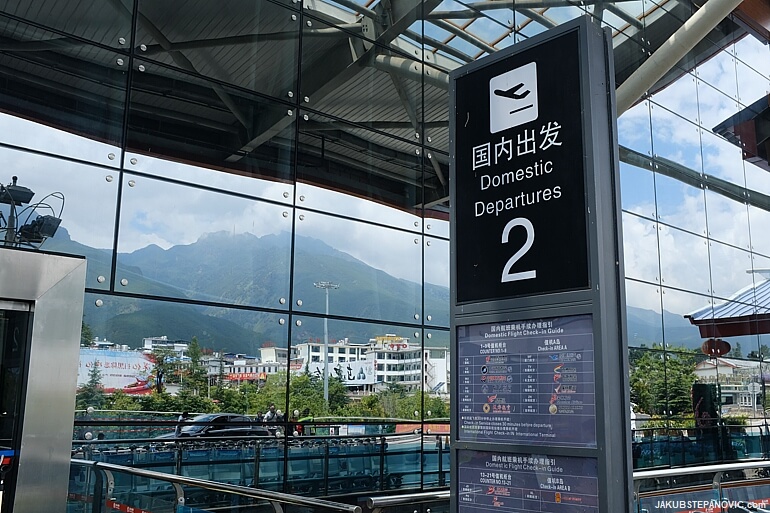
Where the money is just now.
For a regular user, this translates into many new destinations to fly to, lesser delays, cheaper travel, and other enhancements. In 2017, there were no phones allowed during flights at all. No flight mode, nothing. This year, I was happy to hear the announcement that phones are totally okay, but they warned not to use drones on board.
Interestingly, some areas of the infrastructure felt like they change quicker than the people. For example, the roads in China offer a bizarre scene where the signs and cars look like those in the west, but the drivers' behavior is very different. It is because plenty of Chinese drivers are the first generation to drive. Unlike most of the western population, they didn't see their relatives and neighbors drive while they grew up. And so, the mentality reflects that. Instead of the driving habits we are used to, they treat roads more like walking on a sidewalk: You don't use a signal when you want to pass the pedestrian in front of you, there are no road lines, and you don't have mirrors. Applying that on the road, oh, it felt like pure chaos. But I imagine that in a few years, this will be a very different story.
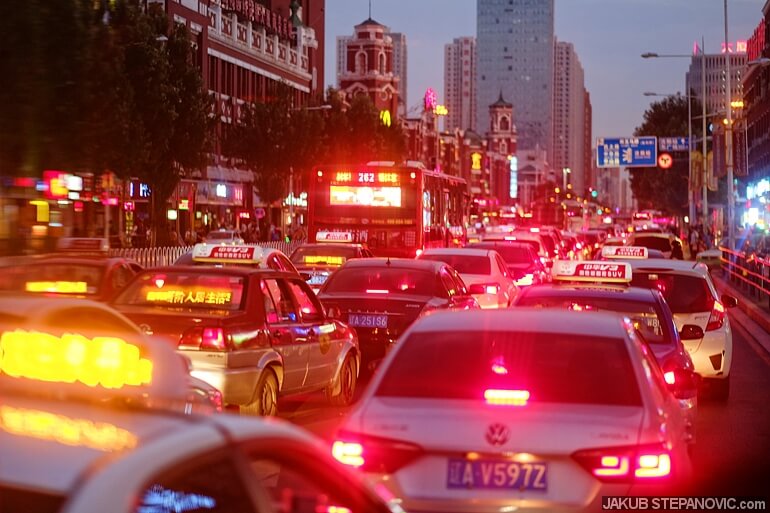
I didn't have a chance to drive a car there, but even riding a bike on those roads was a heart-pounding experience.
Driving wasn't the only element that was not quite there yet. When I boarded a plane for one of the domestic flights, a guy sat in my seat. When I pointed out that I booked that seat, he quickly responded that he was there first and liked that place. Another thing was racial diversity integration. It is still somewhat rare to see a non-local ethnicity in many places in China, which left me – a tall, white person without black hair – with odd experiences.
The number of people who took a picture of me two years ago was mental. I had no issue taking photographs with people who asked me, but most didn't. At first, I took it as a bit quirky experience and didn't care. But after a month or two, this got exhausting. Imagine that you are trying to catch a bus, and suddenly, 20 people swarm you to take a selfie with you. One day, a lady holding a baby came to me, said nothing, and tried to give me the baby while taking her phone in an attempt to take a photo of me holding it. I remember that by the time I was leaving the country, I thought that if I ever go back, I should print a t-shirt with a sign like "Photo = 10 yuan" or "Photograph endangered species instead."
Of course, I didn't. But in those two years, the situation changed. Not that there is a much larger multiracial footprint, but the problem got the attention of local authorities, who ruled it not desired. There were even signs saying, "Don't take photos of strangers" in some public places in 2019. And so, many folks stopped, but others still couldn't resist. The difference is that people adapted a stealth approach to do so. They took the picture from their waist or pretended to call someone while clicking that shutter button like mad.
Going back to the changes at the different speed, it produces many surreal scenes. For example, workers use bamboo brooms to clean platforms in super modern train stations, which offer connections featuring some of the world's fastest rolling stock.
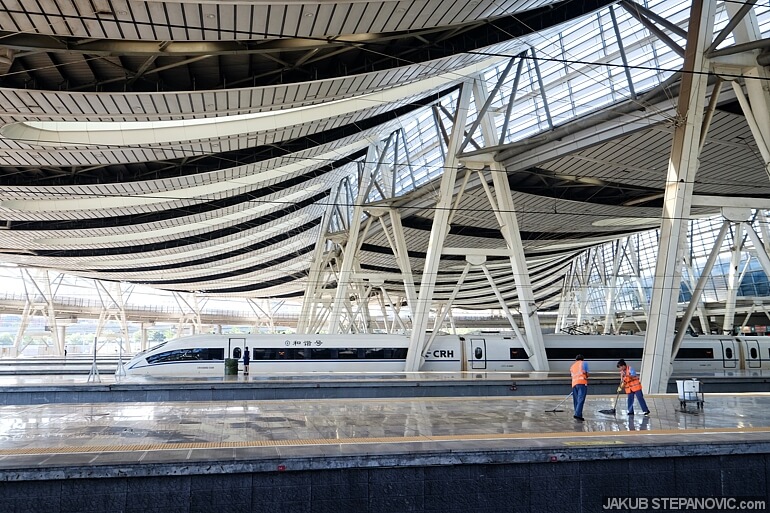
I got an even more exotic feeling of contrast in street markets. Raw meat hung in the hot outdoor air, but no one used cash anymore. It was like having a window to the past and a glimpse into the future simultaneously.
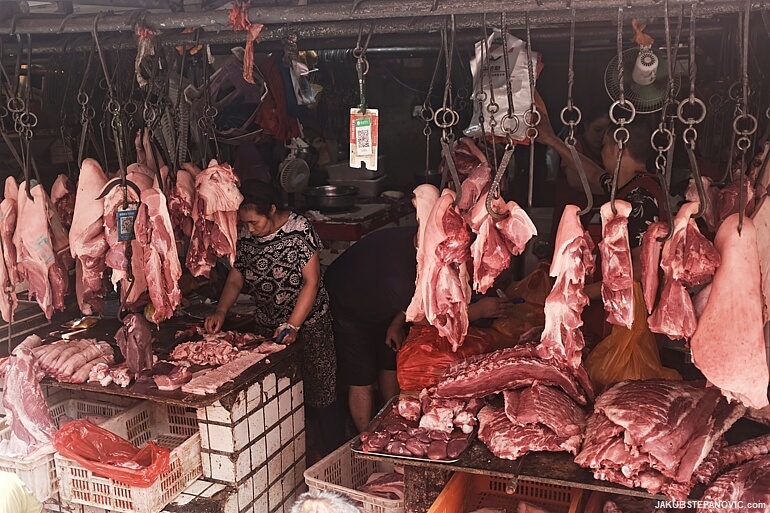
Notice that hook in the middle of the picture above – it holds a qr code, which gets scanned by customers to make the payment. Hardly anyone uses cash anymore.
I went for dinner with a group of friends, and one of them paid for the meal we shared. Then, we divided the price between the rest of us and paid her our share. I was the only one who didn't send money through an app; I handed her cash and was surprised when she had to look at the numbers on the notes. She didn't touch it in years, so she forgot what physical money looked like.
Most transactions are through smartphones, but another emerging method leaves cellphone transfers looking like a stone-age spectacle – I saw certain vending machines allowing people to pay with their faces. They came to the device, pressed a touchscreen with what they wanted, and then smiled at the thing. It recognized their face, which is associated with their bank account. The transaction was done, and the screen wrote a personalized "thank you for your business" line with their name. I stopped and watched it with fascination for a while when I first saw it. Considering that some countries I visited haven't moved to contactless debit cards yet, this was a scene out-of-this-world.
Cashless payments bring me to perhaps the most staggering part of the change I observed: tech everywhere. And in this field, the locals adapted faster than the west. Super-tall buildings covered with led lights have doors or even mailboxes with fingerprint locks... China can be futuristic beyond belief.
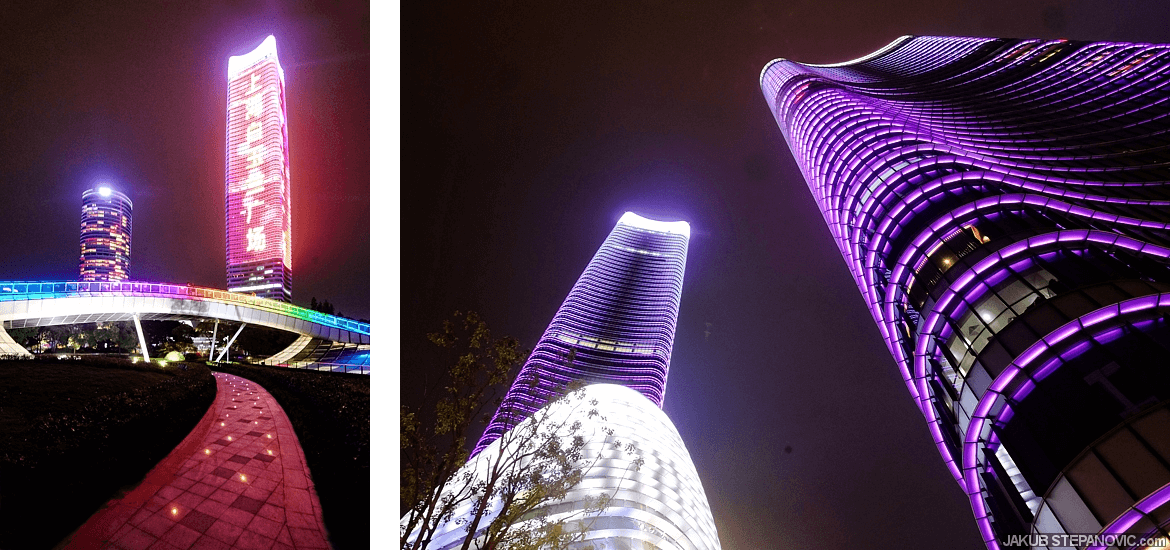
But while I watched the tech with amazement, I couldn't escape the Orwellian feeling because the tech was watching me back. I am still unsure of what to think about all that.
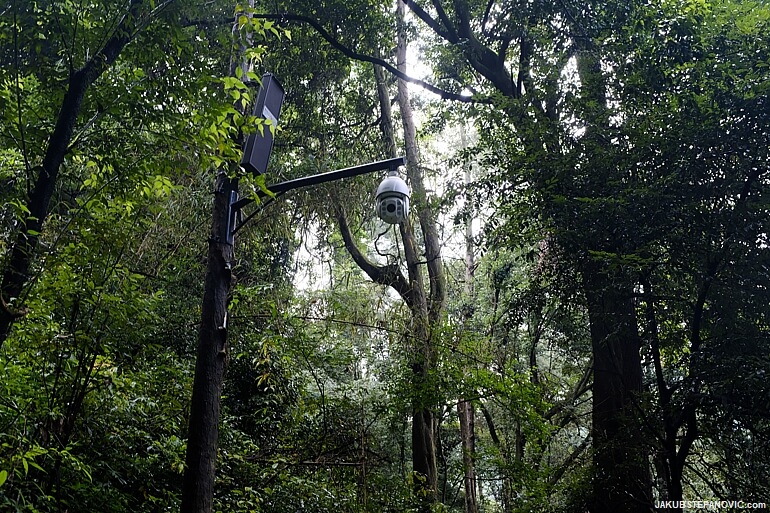
Never mind urban areas; cameras are even in woodland parks. One is watched everywhere they go.
There's no doubt that all the smartwatches, smart houses, smart cars, and smart-everything that is slowly taking over the world bring some convenience, but at the same time, privacy and independence are vanishing. Then, it is up for debate whether it is better to have private companies or the governments know all your personal details.
Having the second can sound scary, and for good reasons. When one has to avoid certain topics to stay out of trouble with the authorities, that's one. But having the data in public hands can also lead to a greater good, as the government can efficiently address safety, plan urban development, and contribute to teaching good principles to people. Take recycling: there were bins for recyclables already in 2017, but no one knew what they were for and how to use them – therefore, they were useless. In 2019, many people already recycled well. I met many residents interested in the scheme, and I was told that kids are being taught it in schools. How can surveillance help here? In some areas of Shanghai, which lead the green movement, one gets a fine if they catch them not recycling. It might seem a bit harsh at first, but when people text while driving, they get a fine, and the public accepts it as a meaningful reinforcement. Recycling has proven beneficial, so why not reinforce that as well? If handled responsibly, restricting some "freedoms" helps society – think of limiting speed in cities, access to addictive substances, and so on.
While private companies can benefit society, it is a secondary product after prioritizing shareholders' profits. Today's most influential media corporations are far from being neutral platforms for expression, and some companies even use their power to push people into habits that were proven to be unhealthy, such as the tobacco industry.
More than the system, it is about those in power having good values. However, since people across the world can't get to agree on the definition of what good is, we are where we are.
Coming from Scotland, where folks can banter about politics, read the internet without heavy censorship, and access many services free of charge, China's self-proclaimed nickname "people's republic." left me thinking that it refers only to its population. One has to pay extras for drinkable water in China, never mind entering museums or national parks. With more humanism-focused changes, China has the potential to become a people's republic. As of now, though, it is the republic of progress. Like no other. It was incredible to experience it.
Thanks for reading! If you enjoyed this article, you might also like my other posts about China. Alternatively, browse my Blog Archives for more long reads and different topics.
Comments are closed.